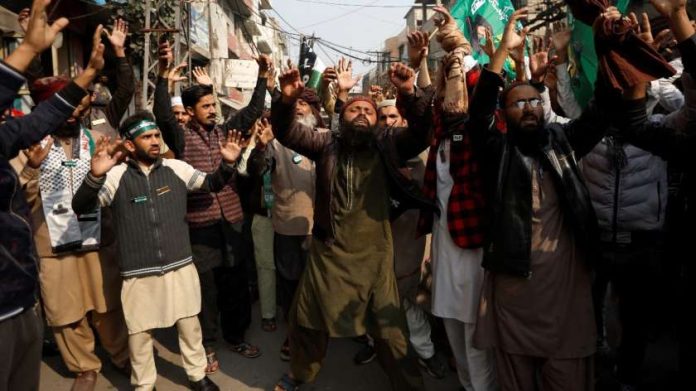With the Army engineered ‘General’ elections in Pakistan ensuring that Shehbaz Sharif emerges as Pakistan’s newly ‘selected’ prime minister, Rawalpindi would have certainly celebrated its great success. However, with euphoria of having politically ‘neutered’ the one who gave Pakistani Generals the ungainly moniker of “neutrals” over, it’s time for Pakistan’s real kingmaker Gen Syed Asim Munir [who also doubles up as its army chief] to get down to serious work and take stock of the chaotic situation the military has spawned.
Gen Munir needs no reminding as he is a meticulous person known to be one who neither forgets nor forgives. He’s already on the job of tying up all the loose ends to ensure that Pakistan Tehreek-e-Insaaf [PTI] party chief and former Prime Minister Imran Khan’s political aspirations have no scope of resurrection. He also knows very well that the widespread public dissatisfaction generated by physical and psychological intimidation of the PTI’s rank and file is a ticking time bomb that needs to be defused quickly and with great finesse.
So, it was expected that the elections and its resultant political fallout would be high on the agenda of the corps commanders’ conference held on March 5, and the post-conference press release issued by the Pakistan Army’s media wing Inter Services Public Relations [ISPR] has confirmed the same.
The ISPR press release states “The Corps Commanders Conference has expressed satisfaction over the smooth democratic transition of power in the Centre and Provinces” [Emphasis added]. The question that arises is- how can the army endorse untainted conduct of the entire election process so definitely? After all, doesn’t the ISPR statement specifically mention that the “Armed Forces of Pakistan provided [a] security environment for the conduct of General Election-24 as per the given mandate and had nothing to do with the electoral process.”? [Emphasis added].
Given Rawalpindi’s history of meddling in politics, the recently concluded general elections in Pakistan were closely watched by the international community, various rights organisations as well as independent observers, and the general consensus is that the elections, to say the least, have been “controversial.” So, it’s but natural for Rawalpindi to try and create an illusion of orders and instructions being implicitly followed during the entire election process- from canvassing to result declaration. How many will believe this is anybody’s guess!
ISPR will surely deny the Army’s involvement in orchestrating elections results, but if this is really the case, then why would there be such a pervasive barrage of accusations against the Army? Moreover, if this allegation lacks substance, then where was the need for ISPR to get so worked up and state that the corps commanders’ conference “expressed dismay that some vested small segments of polity and media especially social media have been maligning Armed Forces of Pakistan with unsubstantiated allegations of interference which is highly deplorable.”?
Similarly, ISPR’s statement mentions that during the conference it was “emphasised that due legal processes should be followed with evidence and proof rather than resorting to unconstitutional and uncalled for baseless political rhetoric and emotional outbursts.” If this menacing statement was meant to silence critics, then Rawalpindi needs to realise that unlike days of yore, such arm twisting doesn’t work anymore, and JUI-F chief Maulana Fazlur Rehman’s hard hitting, no-holds-barred response is proof of the same.
Reacting to the ISPR’s missive, the JUI-F chief highlighted the judiciary’s subservience to the military by saying, “When a politician stands against the establishment [Pakistan Army], the judiciary becomes active” [Emphasis added], and rightly noted that “No decision of the judiciary of Pakistan is presented as a precedent in the world.” One could have rejected these assertions had Rehman been the only one to have raised the issue of an existing nexus between the Army and judiciary, but unfortunately, many others have also done the same.
In 2018, senior Islamabad High Court [IHC] Judge Justice Shaukat Aziz Siddiqui, who was in line to become its chief justice, publicly revealed that “Today the judiciary and media have come in the control of ‘Bandookwala’ [Army]” [Emphasis added] and that “Judiciary [in Pakistan] is not independent.” He even disclosed that “In different cases, the ISI [Inter Services Intelligence, Pakistan army’s spy agency] forms benches of its choice to get desired results.” [Emphasis added].
There’s yet another far more damning revelation coming from the very horse’s mouth.
In 2016, former President and ex Pakistan Army chief Gen Pervez Musharraf admitted in a TV interview that when he was placed in the ‘exit control list’ by the courts, the then Army chief Gen Raheel Sharif “did help me” to get out of it as “I have been his boss, and I have been the army chief before him . . .” Ruminating that “ . . . our judiciary should move towards justice,” Gen Musharraf revealed that “these courts work under pressure behind the scenes and then give decisions. The Army chief had a role to play in releasing the pressures behind the scenes.” [Emphasis added].
With the faceoff between the Army aided by the judiciary and the politicians supported by the public likely to gain momentum with passage of time, Pakistani politics has all ingredients of a pot boiler and holds promise of interesting times ahead!

